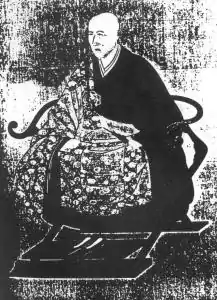Takuan Sōhō
Takuan Sōhō (沢庵 宗彭, December 24, 1573 – January 27, 1645) was a major figure in the Rinzai school of Zen Buddhism.
Takuan Sōhō | |
|---|---|
 | |
| Title | Rōshi |
| Personal | |
| Born | 1573 |
| Died | 1645 |
| Religion | Buddhism |
| School | Rinzai |
Biography
Takuan Sōhō was born into a family of farmers in the town of Izushi, in Tajima Province (present-day Hyōgo Prefecture). At the age of 8 in 1581, Takuan began his religious studies; two years later he entered a Buddhist monastery of the Pure Land Sect. By the age of 14 in 1587, he started studying the system of the Rinzai school of Zen Buddhism under the tutelage of his sensei Shunoku Sōen (春屋宗園:1529–1611).
By age 36 in 1608, Takuan was made abbot of the Daitoku-ji Temple in Kyoto, Japan. Takuan's appointment was shortened as he left for a prolonged period of traveling. Throughout his journeys, Takuan raised and collected funds for the renovation of Daitoku-ji Temple and other Zen temples.
In 1629, Takuan was banished to northern Japan by the shogunate of Tokugawa Hidetada due to his protest of political interference in Buddhist temple matters pertaining to ecclesiastical appointments. By 1632, there was a general amnesty after the death of Tokugawa Hidetada, and Takuan's banishment came to an end. Later, after a meeting between the two arranged by Yagyū Munenori in Kyoto, Takuan was ordered by Tokugawa Iemitsu (1604–51), who was deeply struck by the encounter, to become the first abbot of Tōkaiji Temple (東海寺) in Edo, which he had constructed especially for Takuan to ensure he could draw on Takuan's counsel at any time.
Legacy
Takuan Sōhō died in Edo (present-day Tokyo) in December 1645. At the moment before his death, Takuan painted the Chinese character 夢 ("dream"), laid down his brush, and died. Despite instructions to bury him in unmarked ground and carry on the normal routine of life without further ado or ceremony, monuments were raised, one being the tomb which may be found in the Shinagawa area of Tokyo at Oyama Cemetery of Tōkaiji Temple.
Takuan advised and befriended many people, from all social strata. Some of these included:
- Itō Ittōsai (Kenjutsu master, founder of the Ittō-ryū)
- Mikogami Tenzen (Kenjutsu master, successor of Itō Ittōsai)
- Yagyū Munenori (daimyō and kenjutsu master, head of Yagyū Shinkage-ryū style of swordsmanship) Takuan's writings to Lord Yagyū Munenori and Mikogami Tenzen are commonly studied by contemporary martial artists.
- Matsudaira Dewa no Kami (daimyō)
- Ishida Mitsunari (daimyō)
- Kuroda Nagamasa (Christian daimyō)
- Go-Mizunoo (abdicated Japanese Emperor)
- Tokugawa Iemitsu (shōgun)
Takuan remained largely unaffected by his popularity and famed reputation. Known for his acerbic wit and integrity of character, Takuan exerted himself to bring the spirit of Zen Buddhism to many and diverse aspects of Japanese culture, such as Japanese swordsmanship, gardening, sumi-e, shodo, and sado.
His collected writings total six volumes and over 100 published poems, including his best known treatise, The Unfettered Mind. His influence permeates the work of many present-day exponents of Zen Buddhism and martial arts. He has been credited with the invention of the yellow pickled daikon radish that carries the name "takuan".
Of the three essays included in The Unfettered Mind, two were letters
- Fudochishinmyoroku, "The Mysterious Record of Immovable Wisdom", written to Yagyū Munenori, head of the Yagyū Shinkage school of swordsmanship and teacher to two generations of shoguns.
- Taiaki, "Annals of the Sword Taia", written perhaps to Munenori or possibly to Ono Tadaaki, head of the Itto school of swordsmanship and an official instructor to the shogun's family and close retainers.[1]
Takuan's morality has become the object of scathing criticism. Brian D. Victoria in "Zen at War" argues that Takuan is among the chief culprits of Zen Buddhism that created a religion unrecognizable as Buddhist. It is because Takuan repeatedly makes reference to the emptiness of opponents who may be murdered without consequence. Victoria understands Takuan to have transgressed the first grave Buddhist precept of 'Do not kill.' This revisionist view is not uncontroversial.[2]
Fictional appearances
He is featured as a character in Vagabond, a manga series, which is largely based on Eiji Yoshikawa's equally successful book, Musashi.
Director/writer Yoshiaki Kawajiri in his popular animated film Ninja Scroll created one of main characters Dakuan as a homage to Takuan Soho.
In director Hiroshi Inagaki's Samurai trilogy (Samurai I: Musashi Miyamoto, Samurai II: Duel at Ichijoji Temple and Samurai III: Duel at Ganryu Island), Takuan is played by Kuroemon Onoe and is portrayed as the mentor of Miyamoto Musashi.
References
- Takuan Soho, translated by William Scott Wilson, The Unfettered Mind – Writings of the Zen Master to the Sword Master, p. 3.
- Heine, S (2007). Zen Skin, Zen Marrow: Will the Real Zen Buddhism Please Stand Up. Oxford University Press. p. 140;167. ISBN 978-0195326772.
